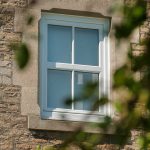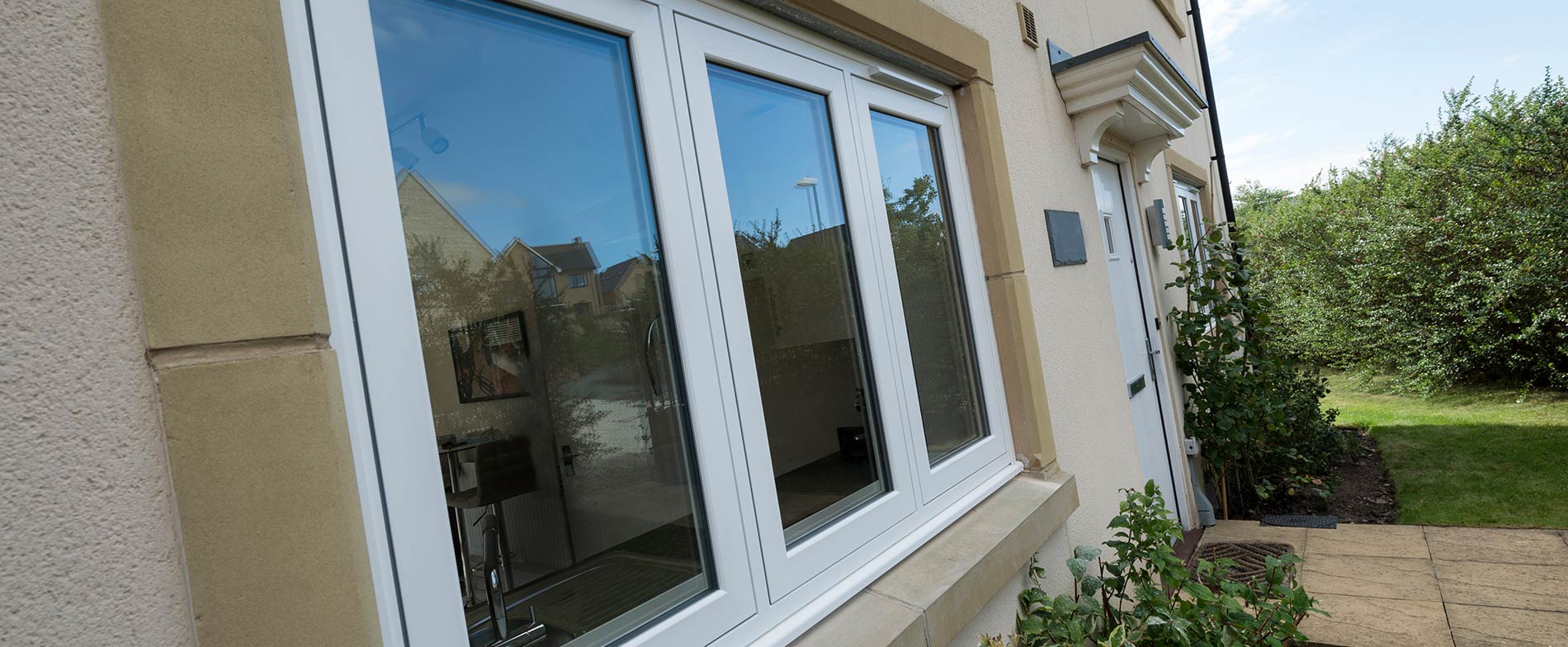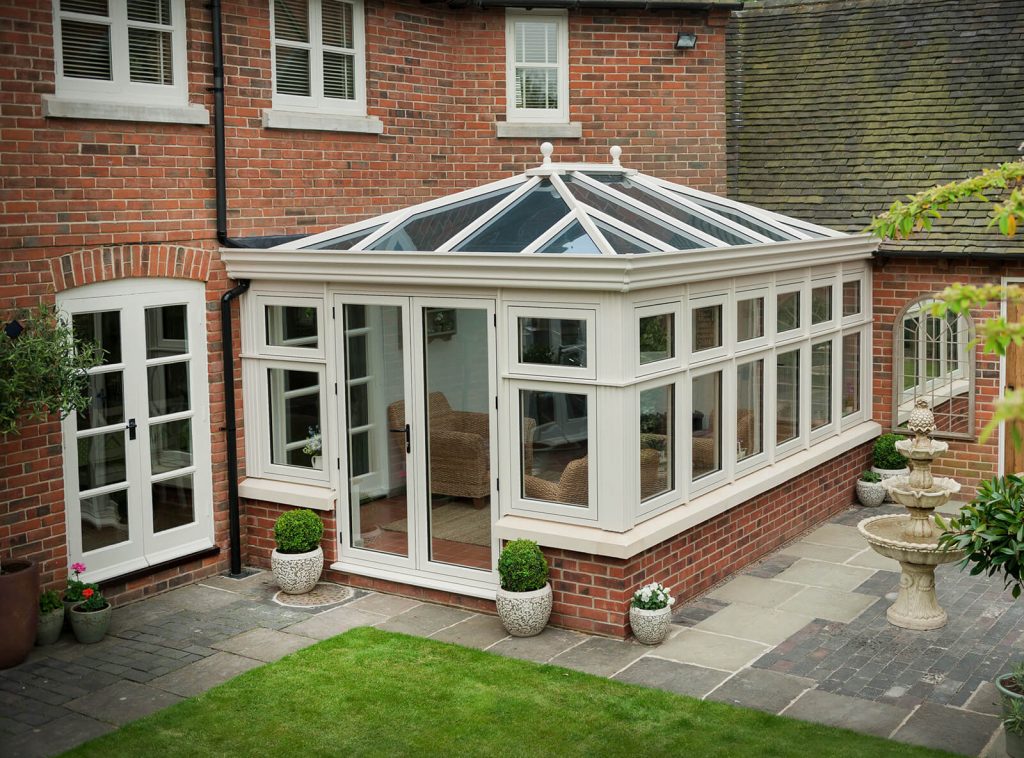Windows in Greater Manchester, Cheshire & beyond
Stylish and practical with options suitable to any type of property.
View productWhen picking the best choice for your home’s windows, it’s important to look at different types and different materials. Aluminum windows have become a common choice for homeowners who want a modern and stylish look. This guide will discuss the good and bad things about aluminum windows. This way, you can make informed decisions when replacing your windows.
Before you decide to invest in new aluminium windows, think about the good and bad aspects. This will help you make a choice that fits your needs and what is important to you. Do aluminum window frames match your home’s style? Do they require the level of maintenance you want? Let’s explore this!
|
Pros |
Cons |
|
High Durability : Aluminum windows are made from premium-grade aluminum, ensuring they last for decades without warping, corroding, or fading. |
Higher Cost : Aluminium windows are premium products, meaning they are priced higher than or uPVC options. |
|
Thermal Efficiency : Modern aluminium windows come with thermal break technology and advanced weather seals, offering excellent insulation, preventing heat loss, and reducing energy bills. |
Thermal Bridging in Older Models : While newer models have excellent thermal breaks, older versions or improperly installed units may still suffer from thermal bridging. |
|
Customisable Designs : Available in a wide range of colors, finishes, and styles, allowing for high customisation to suit various design needs. |
Longer Lead Times : Because these windows are often custom-made, they can have longer delivery and installation times than standard, off-the-shelf options. |
|
Slim and Sleek Design : Modern aluminium windows have ultra-slim sightlines, maximizing glass areas for better views and more natural light. |
Professional Installation Needed : Improper installation can lead to performance issues, so professional fitting is essential, which can add to the overall cost. |
|
Low Maintenance : The powder-coated finish on modern windows is highly resistant to scratches, weathering, and discoloration, requiring little maintenance. |
Aesthetic Limitations : Some might prefer the natural look of timber or the flexibility of uPVC windows for traditional designs. |
|
High Security : Equipped with multipoint locking systems and strong aluminum frames, these windows offer excellent security features, enhancing home safety. |
Colder to Touch : Despite improvements in insulation, aluminum naturally feels colder compared to other materials like wood, which could affect comfort. |
|
Sustainability : Aluminum is 100% recyclable, making it an environmentally friendly choice. |
Complex Repair : Damage to these windows may require specialised repair services or full replacements, which could be more expensive compared to simpler window materials. |
|
Weather Resistance : Designed to perform well in all weather conditions, providing reliable resistance to extreme temperatures, wind, and rain. |
Noise Insulation : While improved over standard aluminum windows, they may not offer as much sound insulation as other materials without special acoustic treatments. |
|
Manufactured in the UK : Many aluminium windows are made in Britain, ensuring high quality and compliance with local regulations. |
Weight : Aluminum windows are heavier than uPVC or wooden frames, which could affect handling during installation. |
One possible downside of aluminum windows is how they handle heat transfer. Aluminum is good at conducting heat. This can cause energy loss, especially in colder places. However, modern aluminum windows often use thermal breaks. These are insulating materials placed between the inside and outside parts of the aluminum. They help reduce heat transfer and improve thermal efficiency. Still, using thermal breaks can raise the overall cost.
Another issue with aluminum windows is that they can get condensation. This often happens in areas with high humidity. When warm, moist air touches the cold surface of the aluminum, it turns into water droplets on the window panes. However the risk of this is reduced in modern aluminium windows.
Aluminum windows are usually low maintenance. However, they still need some cleaning now and then to avoid dirt and grime buildup. This buildup can affect how they look and how long they last.
Aluminum windows have many good points. They are known for being strong and lasting a long time. Aluminum does not warp, rot, or fade, which makes it a great choice for homeowners.
One big plus is that aluminum windows come in many designs. You can find them in lots of colours and finishes. This way, you can match them with any building style. Whether you like something classic or modern, there are aluminum windows that fit your style.
They also offer:
 Functional Benefits of Aluminum Windows
Functional Benefits of Aluminum WindowsAluminum windows are not only nice to look at, but they also have many practical benefits, including a wide range of colours. This is why they are a popular choice for homeowners. Their strength allows for bigger window sizes and different shapes. This helps to bring in more natural light and offers unobstructed views. This is very helpful for those who want large picture windows or sliding glass doors.
Thanks to the strong nature of aluminium frames, these windows are very tough. They can handle harsh weather conditions, including extreme weather. Unlike other window materials that can rot, warp, or fade, aluminum stays strong for many years. This means they perform well over time and do not need to be replaced often. This toughness makes aluminum a great option for homeowners who want a strong window that lasts.
Because they last a long time, they offer good value. This makes them a smart choice in the long run.
Aluminum windows are well-known for being easy to take care of. They need very little upkeep. Unlike timber windows, which must be painted, stained, or sealed often, aluminum windows stay looking good with just a small amount of maintenance. This is great for homeowners who want to spend less time on chores and more time enjoying their homes.
Cleaning aluminum windows is simple. Usually, a quick wipe with soapy water can get rid of dirt and grime.
Aluminum also resists moisture, pests, and rot. This helps make it easy to care for, reducing worries that come with other window materials.
Aluminum windows are not only strong and nice to look at, but they are also good for the environment and save energy by reducing exterior noise. The way they are made is now much better for our planet. Aluminum can be recycled easily, too. With new technology like thermal breaks and double glazing, these windows are great at keeping your home warm or cool. This can help lower your energy bills by keeping your home’s temperature just right.
Aluminum is a very sustainable material. It is known for being easy to recycle. This eco-friendliness makes aluminum a great choice for homeowners who want to lower their carbon footprint. When you choose aluminum windows, you support sustainable living. They can be recycled many times without losing their structural integrity.
Recycling aluminum over and over cuts down the need for new aluminum. This helps lower greenhouse gas emissions from making new products. So, aluminum is an environmentally friendly option for anyone wanting to make a positive impact.
Aluminum is a good heat conductor. However, new window technology has greatly improved how aluminum windows perform. Adding thermal breaks in the frame design creates a barrier. This barrier reduces heat transfer between the outside and inside aluminum surfaces. It helps with energy efficiency.
Thermal breaks are often made from materials like polyamide or polyurethane. They help keep heat inside during winter and stop heat from coming in during summer. This leads to more stable indoor temperatures and can lower energy use. Because of this, today’s aluminum windows can perform well and are an energy-efficient choice for homeowners.
Using double or triple glazing also helps. This means having two or three panes of glass with a vacuum or insulating gas in between. This setup boosts the insulation of aluminum windows. It leads to a more comfortable home and better energy efficiency.
Aluminium windows may incur a higher cost at first than some other options. However, they last a long time and need very little care. This often means you can save a lot of money over time. Their strong build means you won’t have to replace them often. This helps you avoid the cost and trouble of needing new windows every few years. Also, they provide great insulation, which can lower your energy bills. This makes them a smart choice for your money.
Understanding the cost difference between aluminum windows and other window types is key to making informed financial decisions. Here’s a simple comparison of aluminum windows with their common counterparts – uPVC (a type of vinyl) and wooden windows:
|
Feature |
Aluminum Windows |
uPVC Windows |
Wooden Windows |
|
Initial Cost |
Medium |
Low |
High |
|
Durability |
High |
Medium |
High (with maintenance) |
|
Maintenance |
Low |
Low |
High |
|
Energy Efficiency |
High (with thermal breaks) |
Medium |
High |
While the initial investment for aluminum windows is generally higher than uPVC windows but lower than wooden windows, the long-term savings they offer are worth considering. Their exceptional durability, minimal maintenance needs, and high energy efficiency (especially with thermal breaks) can lead to significant cost reductions over time.
 Potential Drawbacks
Potential DrawbacksAluminum windows have many benefits, but it’s important to think about some downsides before you decide. One thing to consider is that aluminum heats up well. This can lead to problems with thermal efficiency if it’s not managed properly when installed. Also, because of their design and finish, aluminum windows may not fit well with every type of building style.
One possible problem with aluminum windows is their ability to conduct heat, especially in old or poorly made frames. Aluminum transfers heat better than other materials, which can cause thermal bridging.
Thermal bridging happens when a material that conducts heat well allows heat to flow between inside and outside. This can go around the window’s insulation. As a result, your home may lose heat in winter and gain heat in summer. This affects how energy efficient your home is.
But, modern aluminum windows often fix this issue. They include thermal breaks in the frame. These breaks are made from insulating materials. They stop the constant heat flow through the aluminum. This helps reduce thermal bridging and improves thermal efficiency.
The most popular choices instead of aluminum windows are uPVC windows, and wooden windows. Each choice has its advantages and disadvantages in terms of cost, upkeep, and appearance. The best one really depends on what each person needs.
Yes, aluminium windows are a good choice for homes in the UK. They are strong and can handle the UK’s weather conditions well. Also, they help keep your home warm with their thermal efficiency. Plus, they have good noise reduction features that many homeowners find helpful.
We would recommend aluminum windows for modern, contemporary homes or buildings, especially where durability, low maintenance, and large window openings are important. They offer sleek, slim profiles, excellent structural strength, and can accommodate expansive glass panes. With advanced thermal break technology, they are energy efficient and well suited for harsh environmental conditions like coastal areas. Aluminum windows are also highly secure and customisable, with many colour and finish options. However, they may not be ideal for budget conscious projects or heritage homes that require traditional aesthetics, where uPVC might be more suitable.
 Droylsden Glass boasts over 40 years’ experience in the installation of thermally efficient and highly secure windows, doors and conservatories for homeowners throughout Manchester and Cheshire.
Droylsden Glass boasts over 40 years’ experience in the installation of thermally efficient and highly secure windows, doors and conservatories for homeowners throughout Manchester and Cheshire.
Do you have a general query about one of our products or would you like to know about available options and styles? Get in touch with the team at Droylsden Glass today.
Contact usStylish and practical with options suitable to any type of property.
View productEnhance your home’s entranceways in a variety of different ways.
View productIncrease the living space in your home with our assortment of glazed extensions.
View productKeep your roofline performing as it should with our selection of roofline products.
View productTransition from the outside to the inside of your home in total style.
View productGarden canopy options to suit all Greater Manchester, Cheshire, and Northwest homes.
View productWe are accredited by a variety of highly reputed regulating bodies that cover the construction industry.
We have been carrying out quality installations in Chester, Warrington, Wirral, Trafford, Bolton, Oldham, Manchester, Cheshire, Tameside & Stockport for over four decades. View our products by visiting our showroom today.
42-56 Audenshaw Road
Audenshaw
Manchester, M34 5HJ
For sat navs use the address below
York Street, Audenshaw, Manchester, M34 5HJ











